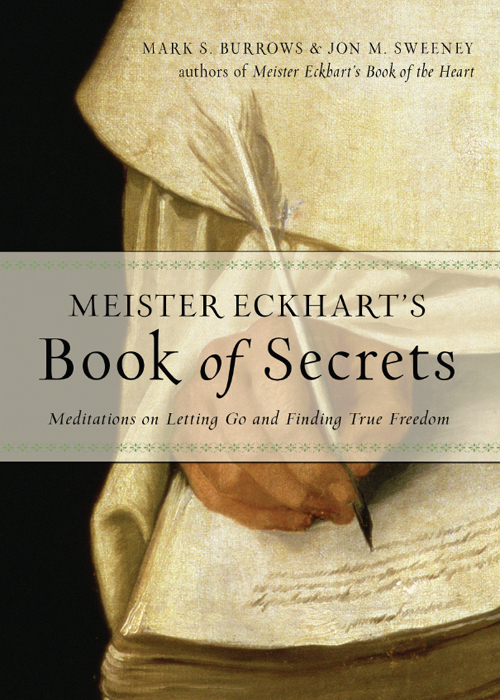
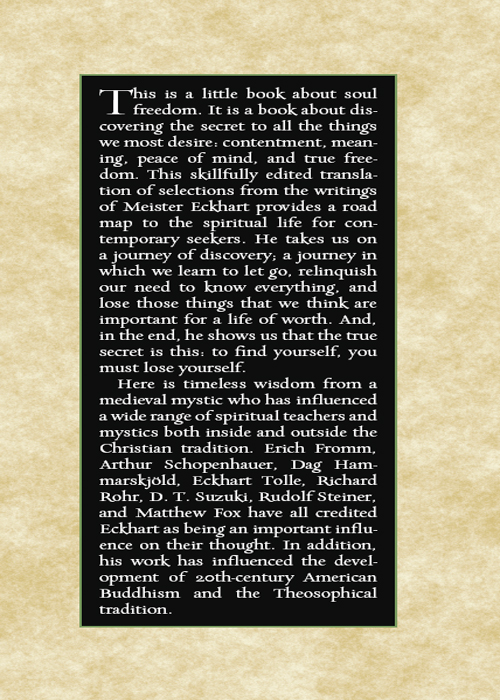
 Copyright 2019
Copyright 2019
by Mark S. Burrows and Jon M. Sweeney
All rights reserved. No part of this publication may be reproduced or transmitted in any form or by any means, electronic or mechanical, including photocopying, recording, or by any information storage and retrieval system, without permission in writing from Red Wheel/Weiser, LLC. Reviewers may quote brief passages. Cover art: Brother Pedro Machado (d.1604), by Francisco de Zurbaran,
(1598-1664) Real Academia de Bellas Artes de San Fernando,
Madrid, Spain/Bridgeman Images
Typeset in Truesdell Hampton Roads Publishing Company, Inc.
Charlottesville, VA 22906
Distributed by Red Wheel/Weiser, LLC
www.redwheelweiser.com Sign up for our newsletter and special offers by going to
www.redwheelweiser.com/newsletter/.
ISBN: 978-1-57174-847-8 Library of Congress Cataloging-in-Publication Data
available upon request Printed in the United States of America
M&G 10 9 8 7 6 5 4 3 2 1
CONTENTS

INTRODUCTION
T here is a secret hidden within each one of us. Meister Eckhart knew this, and never tired of speaking about itin sermons delivered before ordinary people, for special audiences of cloistered nuns, and in the intellectual halls of his day. What is this secret? It is many things, and it is nothing at all. The secrets that Meister Eckhart speaks of are similar to ones that Jesus alluded to when he taught the parable of the hidden treasure and the parable of the pearl of great price. In the first tale, a pilgrim discovers treasure hidden in a field and immediately seeks to purchase that field. In the second, the pilgrim discovers a pearl of great price, went and sold all that he had, and bought it.
But, of course, these secrets aren't really for sale. No one can buy what's spoken of here. On the contrary, to discover these secrets, one must be willing to give up a great deal. There's giving up, for instance, the effort we expend trying to build up a self-image. There's giving up the need to justify ourselves. There's letting go of everything we thought we had, in order to hold on to what actually gives our lives meaning.
If this all sounds intangible, that's because it is. But it is no less real for that. When it comes to the treasure upon which our worth depends, the pearl that finally matters, the work before us is not that of accumulating, which is so much part of our consumer culture, but rather that of letting goof what we think we need to make sense of things. For much of this is finally little more than a barrier to the very thing we most desire: contentment, peace of mind, rest in our heart. The Meister knew about this, reminding us that the secret to such things is generally out of reach only because we have sold our soul to bidders who cannot deliver what they promise: true freedom. Or what we once spoke of as soul freedom.
What is this freedom? It is the open secret of our true nature, that within us is the treasure, the pearl of great price, buried in the field of our lives. And that we are the only ones in a position to let go of what we do not need to gain this treasure, opening ourselves to the true self that was within us from the beginning. Eckhart knew much about this as a Dominican friar, often called upon to teach students in Paris and Cologne as well as preaching to congregations far and wide, including many in the convents of the province of Thuringia and later Saxony, which he served as provincial. He was tireless in speaking of our essential nobility at a time when much of the church's rhetoric gave little attention to this ancient wisdom. One of his favorite themes, which had become something of a secret in the hands of many theologians and preachers of the day, was that each of us has what he called a noble soul. No, more than this: that each of us is such a noble soul, and that this is the pearl of great price that lies in our heart.
This inner selfor ground, as Eckhart often called itis the one treasure God desires us to find, a gift given at the beginning that abides within us all along this pathless path, to recall his image. The journey of discovering this way happens when we open our hearts to embrace it as our true self. For this reason, freedom of the soul is not an ambition for something beyond us, but rather a gift we carry within ourselves. It is the treasure in our heart that lies in wait for us to find. When we do, we discover that we are nothing less than the very image of God, and that we and God are finally one. This seems so simple.
But it is not necessarily an easy path to follow, as those know who have lost themselves in the hurry and worry of their lives. Does this mean that we should resign ourselves to doing nothing, a resignation that in olden times was denounced as the heresy of quietism? By no means, according to Eckhart. But we must be careful to remember that the discovery of this treasure is not one more achievement we can manage. It is not something we do. It has more to do with undoing, letting go of our need to manage our lives, freeing ourselves to seek this treasureand coming to see that it waits for us in every moment. How do we find the courage to do this? That, too, is a kind of open secret, as the Meister knew: it requires relinquishing our desire to know about what we might gain.
What it depends upon is our willingness to lose what we thought was necessary to give us worth in our lives. We must die to that self if we hope to discover our noble self, which is the ground of our lives. As he once put it with characteristically paradoxical language: Now as the soul loses herself in all ways, she finds that she is herself that same thing which she has sought without success. In this experience, he goes on to say, the soul knows her own beauty. Which is what we hope for, beneath the surface of all our restlessness, our insatiable hunger for things, our seemingly endless desire to find meaning, and the depletion that comes of all this. All of this has developed a quite lucrative spiritual market in today's worldwith a seemingly endless offering of self-help books and seminars, some to have on the cheap, others costing a pretty sum.
But at the end of the day, the secret is this: to find yourself, you must lose yourself, letting go of what you thought you needed. This is the path that ultimately leads to true freedom. Jesus said it, again and again, and so did Meister Eckhart in his sermons and writings. Our renderings of his thought give voice to his wisdom in the poems that follow. If this is what you yearn for, if this is the pearl you are willing to sell all you have to find, Eckhart's wisdom might be the royal road you are seeking. Even if it seems daunting, it will be a wager worth trying.
For if Eckhart is right, these secrets are the treasure that promises nothing less than true freedom and fullness of life.  Finally, then, a word about the form of the meditations gathered in this volume. Meister Eckhart wrote within the expected parameters of theological discourse in his day, at least in terms of their outward form: sermons, both in Latin and German, academic texts addressing disputed questions in the schools, and edifying treatises composed for his Dominican confreres. But his thought was profoundly poetic, even if he did not venture into the formal domain of poetry. The poems found here, then, are not his, at least not strictly speaking. As with our earlier book,
Finally, then, a word about the form of the meditations gathered in this volume. Meister Eckhart wrote within the expected parameters of theological discourse in his day, at least in terms of their outward form: sermons, both in Latin and German, academic texts addressing disputed questions in the schools, and edifying treatises composed for his Dominican confreres. But his thought was profoundly poetic, even if he did not venture into the formal domain of poetry. The poems found here, then, are not his, at least not strictly speaking. As with our earlier book,
Next page
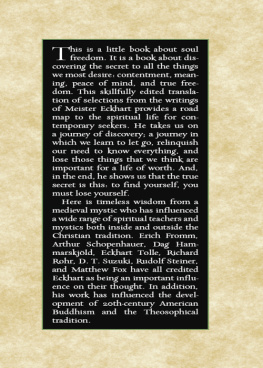
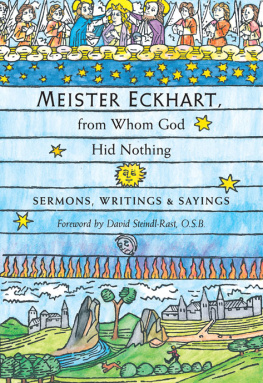
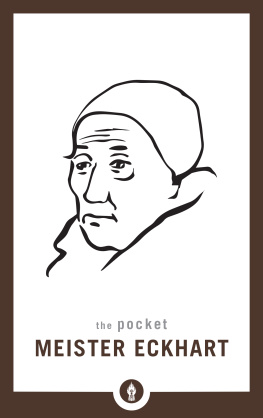
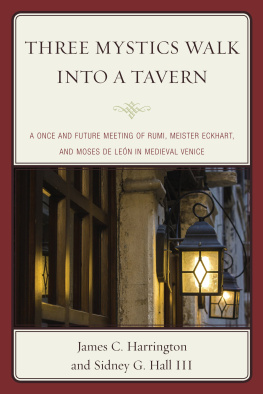
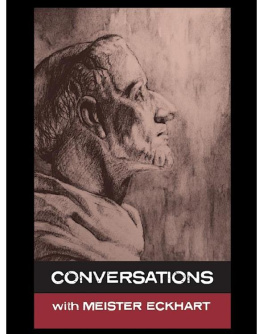
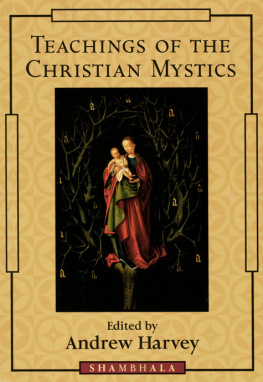

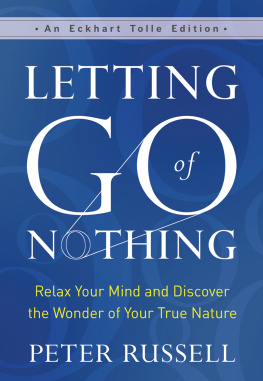
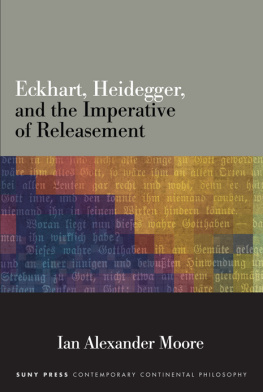
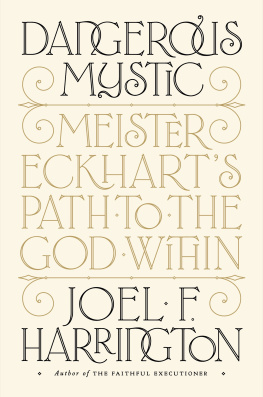
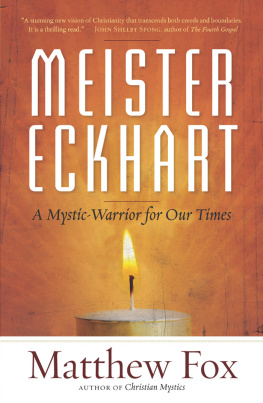
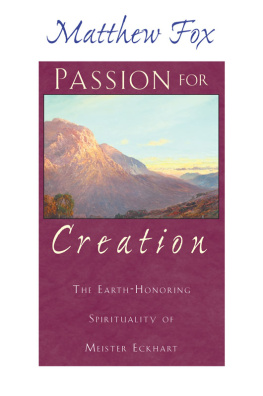
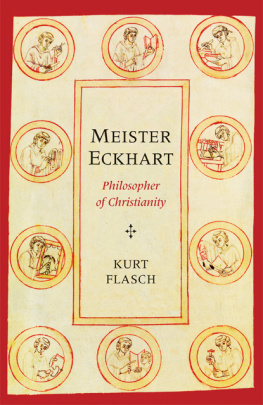


 Copyright 2019
Copyright 2019
 Finally, then, a word about the form of the meditations gathered in this volume. Meister Eckhart wrote within the expected parameters of theological discourse in his day, at least in terms of their outward form: sermons, both in Latin and German, academic texts addressing disputed questions in the schools, and edifying treatises composed for his Dominican confreres. But his thought was profoundly poetic, even if he did not venture into the formal domain of poetry. The poems found here, then, are not his, at least not strictly speaking. As with our earlier book,
Finally, then, a word about the form of the meditations gathered in this volume. Meister Eckhart wrote within the expected parameters of theological discourse in his day, at least in terms of their outward form: sermons, both in Latin and German, academic texts addressing disputed questions in the schools, and edifying treatises composed for his Dominican confreres. But his thought was profoundly poetic, even if he did not venture into the formal domain of poetry. The poems found here, then, are not his, at least not strictly speaking. As with our earlier book,